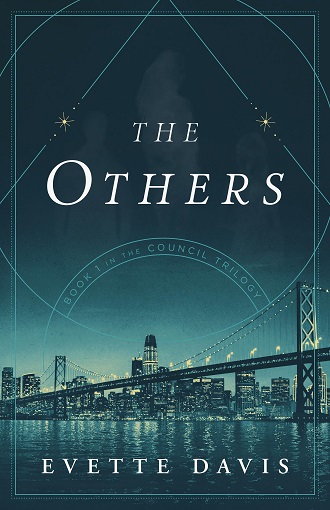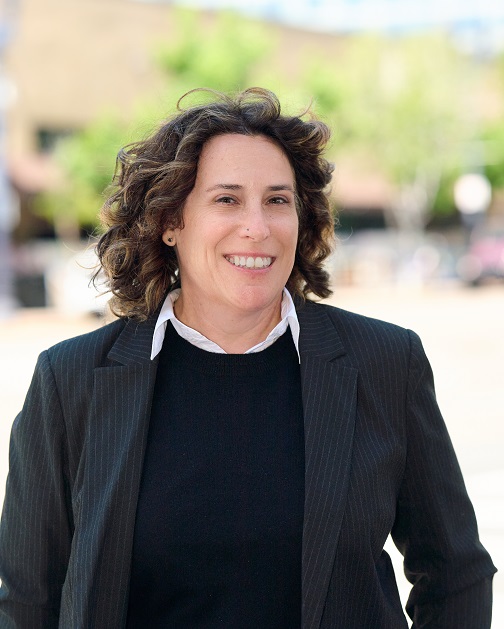The Others and The Council Trilogy are also a way of dealing with my unease over the polarization of politics in this country and how moderates have been robbed of their voice. I gave them magical powers to help get things back on track!
Evette Davis – 29 September 2024
The Back Flap
Much as she wishes otherwise, superstar political consultant Olivia Shepherd was born a powerful empath. It’s a legacy she walked away from long ago—but when she wakes up one morning to find Elsa, a tenacious time-walker, standing in her kitchen, she realizes she can no longer ignore her gifts. She is quickly plunged into the hidden world of powerful “Others” and drafted to work for the Council, a shadowy organization that summons the fog to San Francisco to obscure their involvement in human affairs.
Complicating matters further is Olivia’s new love interest, William. A centuries-old vampire, William is far too jaded to take an interest in human affairs—but Olivia no longer has the luxury of remaining impartial. As shocking details from Olivia’s own past emerge and her role in the Council begins to take shape, will she rise to the challenge of her destiny?
About the book
What is the book about?
The Others is the first installment in an urban fantasy about Olivia Shepherd, a San Francisco political consultant with hidden talents who is plunged into the world of the Council, a shadowy organization of supernatural beings that secretly meddle in human affairs.
When did you start writing the book?
I’ve been working on this trilogy on and off for almost a decade. In the middle of my efforts, I derailed myself with a stand-alone novel called 48 States.
How long did it take you to write it?
Most of my books take 2-3 years to write from start to finish.
Where did you get the idea from?
Olivia is the lifelong embodiment of a question I have been trying to solve for decades: where do women derive their power, how do they learn to use it, and how do they reconcile being leaders in the face of societal expectations? The Others began as an idea for a play. I had an idea to create a frustrated political consultant down on her luck who starts seeing an ancient female warrior off-stage. The guide would give her funny advice on besting her adversaries, but only she could see her. Playwriting is not my jam; that is how the novel and the character were born. The Others and The Council Trilogy are also a way of dealing with my unease over the polarization of politics in this country and how moderates have been robbed of their voice. I gave them magical powers to help get things back on track!
Were there any parts of the book where you struggled?
First drafts of a novel are always difficult for me. I really have to let go and get the words on the page, knowing that I will come back many times to refine things.
What came easily?
The banter between some of the characters came to me early on. I had a sense right away about how this group of people would react to one another.
Are your characters entirely fictitious or have you borrowed from real world people you know?
It’s a blend. Certain aspects of people I’ve known or know have helped me develop these characters, but no one character is one hundred percent based on a specific person.
We all know how important it is for writers to read. Are there any particular authors that have influenced how you write and, if so, how have they influenced you?
I’ve been a voracious reader since I was a child, so it’s difficult to list a specific set of writers without leaving someone out. However, I would say Ursula Le Guin, Deborah Harkness, and Norah Roberts are a few of them. I keep Norah in the mix because she is so popular and such a good storyteller. It’s easy to be very intellectual about your influences, but I pay attention to writers who give readers what they crave. Le Guinn because she was a world builder who grabbed you with her tales of the tension between good and evil. And Deborah Harkness because her All Saints Trilogy is one of my favorite reads.
Do you have a target reader?
Not really. Anyone who loves paranormal stories with intense personal journeys, near-death experiences, and erotic moments is welcome!
About Writing
Do you have a writing process? If so can you please describe it?
Since I have a “day job” as the co-owner of a PR firm in San Francisco, I usually write in the evenings after dinner and on the weekends. My family has been very forgiving over the years when we’ve been on vacation, and I’ve asked to stay inside and write for a spell.
Do you outline? If so, do you do so extensively or just chapter headings and a couple of sentences?
I start by drafting biographies for all of my characters and then mapping out the story. I like to look at the pacing of the chapters and ensure that something is happening—if not in every chapter, then pretty close. As I write, I create a chapter guide with a summary of each chapter so I can reference it as I go. I write in pencil because things often change.
Do you edit as you go or wait until you’ve finished?
As I mentioned earlier, I try to write uninterrupted until I have a first draft, which I then edit.
Do you listen to music while you write? If yes, what gets the fingers tapping?
I don’t listen while I’m writing, but I do use music for inspiration, and I have playlists for all of my books.
About Publishing
Did you submit your work to Agents?
I have, and while many have asked to review my work, nothing ever came of it. I’ve self-published on my own imprint and used professional editors and designers to help. Now, I’m with Spark Press which is a hybrid publisher. Working with Spark affords me all of the benefits of a traditional publisher, including Simon and Shuster as our distributor, but I contribute financially as a self-published author would. Spark has to accept your work; it’s not a vanity press that will publish anyone who pays, so I maintain the level of quality that is so important to me as a writer, and I’m thrilled with the other writers on our imprint.
What made you decide to go Indie, whether self-publishing or with an indie publisher? Was it a particular event or a gradual process?
The traditional publishing world is a tough nut to crack, and I had a vision to take my stories to the readers. Hybrid publishing is the perfect solution.
Did you get your book cover professionally done or did you do it yourself?
Spark Press handles the cover design like any publisher would.
Do you have a marketing plan for the book, or are you just winging it?
I have a full-time PR firm working to promote The Others and the rest of the trilogy for the next year.
Any advice that you would like to give to other newbies considering becoming Indie authors?
My advice is to use professional editors to review your work before you publish. Every writer needs an editor, no exceptions.
About You
Where did you grow up?
I grew up in the Los Angeles area before moving to the Bay Area to go to college.
Where do you live now?
For more than twenty years, I’ve lived in San Francisco near Golden Gate Park.
What would you like readers to know about you?
I love public libraries and have spent a good deal of my professional life helping support them. I love being outside and walking around. I can do interesting cities or hiking trails, I just like to keep moving. I’m a big fan of live music, and finally, I split my time between San Francisco and Sun Valley, Idaho.
What are you working on now?
The Gift, the second book in the trilogy, will be published in March 2025. The third book will follow in September 2025. I just finished the second draft of book three, The Campaign, and sent it to my editor. I’ll probably be busy working on revisions to that for most of the Fall. Then, I have my eye on starting a new paranormal series about a magical detective agency.
End of Interview:
Get your copy of The Others from Amazon US.


